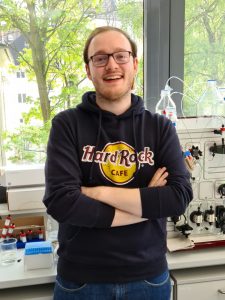 Meet Michael Rütten! He won the STOE Prize of the DGK Young Crystallographers at the Virtual DGK Conference organized by DESY. Congratulations!
Meet Michael Rütten! He won the STOE Prize of the DGK Young Crystallographers at the Virtual DGK Conference organized by DESY. Congratulations!
Michael gained lots of experience under different supervisors as the group of Birger Dittrich (Heinrich-Heine-Universität Düsseldorf), Christian Lehmann (Max-Planck-Institut für Kohlenforschung in Mülheim an der Ruhr) and Tobias Beck (Universität Hamburg). He presented his current research within the Beck group on “Encapsulation of inorganic nanoparticles into novel T. maritima encapsulin variants“ in a 5min. Lightning Talk and the subsequent Poster Session.
Please tell us what your poster is about.
My poster focuses on the encapsulation of inorganic material into novel T. maritima encapsulin variants and their crystallization. The novel encapsulin variants were designed in silico via Rosetta software and the fixed backbone module. Afterwards the protein production was established and optimized. Recently, it became possible to use the highly specific encapsulation mechanism to encapsulate gold nanoparticles into novel encapsulin variants. Before that, the encapsulation of gold nanoparticles was only shown for the native variant. Encapsulin and its cargo-loading mechanism is really versatile [1]. Furthermore, unitary encapsulin protein crystals were obtained and characterized via synchrotron radiation at DESY (P11). Quite interesting is that, depending on the crystallization condition, we can control lattice parameters.
Have you had any special way to prepare your talk and poster?
First, I started designing a draft and thought about what story I wanted to tell. As the presentation was virtual, I had do take a 16:10 layout. For the story, I started with our general strategy to construct biohybrid nanomaterials. Based on that, I focused on the steps of the strategy. For each of the steps I wanted to show recent results and highlighted what is special.
What is the most enjoyable part of your research?
The most enjoyable part of my research is to work in a group with great colleagues and supervisor. We have great scientific discussions and give each other feedback. In the lab, for example, we ask what is currently going on in a certain project and offer support. Furthermore, we have chats and talks about private life. We get along very well with each other. Outside of the lab, we meet regularly (in corona times virtually) and have some social time together. To work in such a stimulating and pleasant atmosphere is crucial to enjoying my research. Being in a good mood thanks to my colleagues and supervisor, strongly improves my motivation. Luckily, I am also working on a highly interesting topic! My research based on the combination of protein containers and inorganic nanoparticles, crystallization, synchrotron radiation and more covers so many exciting topics. Therefore, I am glad and happy to be working on this research.